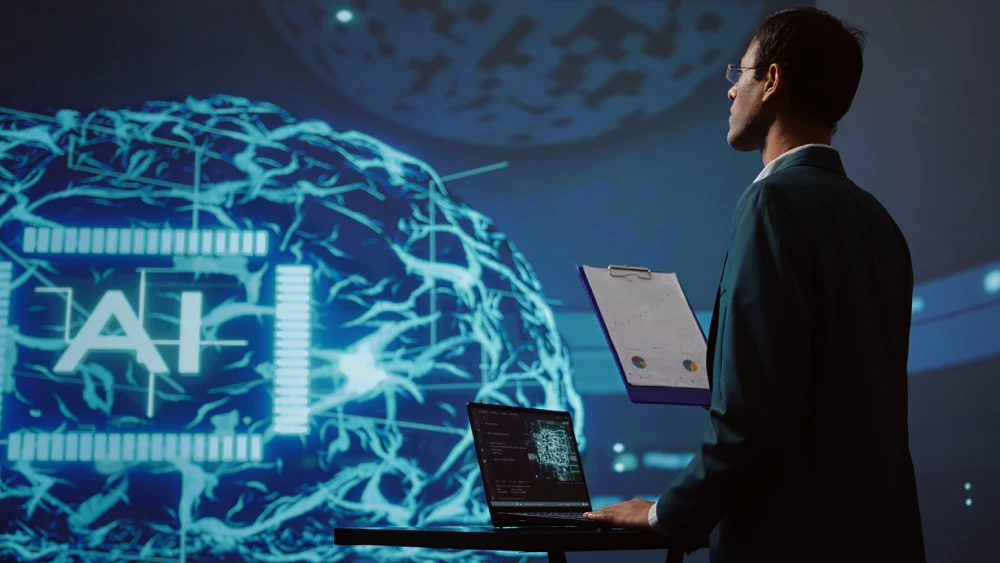Introduction
Artificial Intelligence (AI) is finally making its mark in software testing and fast. QA teams are now embracing AI-driven testing to boost speed, accuracy, and coverage. The result? Less brittle test suites, smarter defect detection, and faster releases. For decision-makers like CTOs, QA managers, and startup founders, it’s time to explore how AI will change the future of software testing and test automation and what it means for delivering high-quality products at scale.
What Is AI-Driven Testing?
AI-driven testing applies machine learning (ML) and artificial intelligence to automate the testing lifecycle. It encompasses:
- Smart test generation: Auto-creating test cases based on code or user behavior.
- Self-healing scripts: Detecting UI changes and updating tests automatically.
- Predictive analytics: Using historical results to flag high-risk areas.
- Test optimization: Prioritizing critical test cases to speed up regression cycles
Why is AI-Driven Testing Important in Software Testing?
- Maximized Test Coverage: AI tools can generate edge-case scenarios that manual or basic automation might miss.
- Efficiency Gains: According to IDC, around 40% of IT budgets are expected to go toward AI testing in 2025. Teams could automate up to 70% of routine QA tasks.
- Fewer False Positives: AI tools learn from past test results, reducing irrelevant failures.
- Speed in CI/CD Pipelines: Integration of AI with pipelines delivers faster feedback and smoother deployment cycles.
Key Challenges in AI-Driven Testing
- Training Data Quality: AI needs clean, labeled data to produce useful tests.
- Transparency and Control: AI-generated flows must be auditable and explainable
- Tool Integration: Ensuring AI tools work seamlessly within existing pipelines and CI/CD setups.
- Specialist Skills: Teams need AI-literate QA engineers—striking a balance between automation and human oversight.
Tools, Frameworks, and Technologies Commonly Used
- Testsigma, Mabl, Functionize, Tricentis, Sauce Labs: Noted among top AI testing tools in 2025.
- ACCELQ Autopilot: Offers code-free test flows, dynamic step generation, and self-healing
- Open-Source + AI: Many teams use AI extensions with tools like Selenium, Cypress, and Playwright
- Future Platforms: Emerging frameworks focus on agentic AI—capable of end-to-end quality checks across code reviews, tests, and security.
Best Practices for Effective AI-Driven Testing
- Build a High-Quality Data Foundation
Establish clean, versioned datasets to train models that generate useful test cases. - Start Small & Iterate
Begin with targeted modules before scaling up. Constant evaluation helps refine effectiveness. - Ensure Clear Traceability
Maintain test logs and reports that explain each AI-driven decision within automation. - Seamlessly Integrate
Plug AI tools into CI/CD pipelines, dashboards, and version-control systems to maintain consistency. - Human-in-the-Loop
Allow QA experts to review AI-generated tests and calibrate rules—especially in mission-critical environments. - Continuous Feedback Loop
Use production defects and test failures to refine AI models and improve future test cycles.
How Our QA Consulting & Testing Services Can Help
At Teknotrait Solutions, we combine human expertise with intelligent automation to deliver effective AI testing services:
- Strategic Integration
We assess your current QA workflows and integrate AI tools like Mabl, ACCELQ, and custom ML models tailored to your needs. - AI Model Training
We help curate and label high-quality data, enabling smarter test-case generation and predictive analytics. - Self-Healing Frameworks
We build automated frameworks that adapt to UI or API changes, reducing ongoing maintenance. - Advanced CI/CD Integration
We implement seamless AI tools within Jenkins, GitLab, or Azure DevOps pipelines for near-instant feedback loops. - Expert Oversight
Our QA consultants provide the right balance of AI efficiency with human review to ensure reliable test outcomes.
Partner with us to future-proof your QA approach and deliver smarter, faster, and more reliable releases.
Conclusion
How AI will change the future of software testing and test automation? Quite significantly. From smart test generation and self-healing scripts to predictive analysis and agentic testing, AI is reshaping QA. But successful implementation hinges on clean data, seamless integration, and ongoing human oversight. Looking ahead, QA teams that strategically adopt AI-driven testing will win in delivery speed, quality, and innovation.



